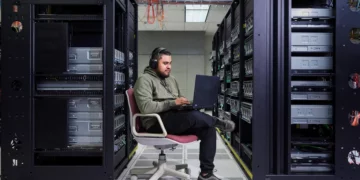
When extreme weather strikes, it hits vulnerable populations the hardest. In the current global climate of stronger and more frequent storms, heat waves, droughts and floods, how do we build more positive environmental and social impact? We have a responsibility to apply our technological expertise, resources and ecosystem to help the world become more resilient to these environmental challenges.
We need a three-pronged approach to long-term sustainability: preparing the workforce with skills for a greener future; forging strategic cross-sector partnerships; and empowering purpose-driven individuals and organizations with the right tools and technology to accelerate action.
Equipping the current and future workforce with green skills
According to new Morning Consult research commissioned by IBM, 71% of business leaders surveyed anticipate their business will emphasize sustainability skills criteria in their hiring in the next two years, with 92% expecting to invest in sustainability training in the next year. There is already a skills gap in technology and sustainability, and these results show that it continues to grow.
But when it comes to training and credentials in green and technology skills, there just aren’t that many options. IBM already has a strong track record of providing free skilling resources to communities that are underrepresented in tech, most recently with a commitment to skill 2 million learners in AI. So, to help prepare the experts of tomorrow with the green and technology skills they need, we are providing free training on IBM SkillsBuild.
Our initial curriculum offerings will include three courses: Sustainability and Technology Fundamentals, Data Analytics for Sustainability and Enterprise Thinking for Sustainability. Through these foundational courses, learners will explore topics like ecology, biodiversity and social impact to help them develop a comprehensive understanding of sustainability.
Lessons will include real-life case studies and opportunities to learn about how AI can assist businesses in achieving sustainability goals and mitigating climate risks. The courses also provide instruction in data analytics contextualized around sustainability use cases. We will also add more advanced courses that take a deeper look at how data analysis and visualization skills can be applied to practical sustainability use cases, such as examining energy consumption in a community.
These courses are available to high school students, university students and faculty, and adult learners worldwide. Learners are free to take as many courses as they want and to study at their own pace. Upon successful completion of some of these courses, learners receive a credential that is recognized by employers.
IBM SkillsBuild has a global reach, and it has already benefited many learners with the inspiration and resources they need to pursue careers in technology. For instance, in Nigeria, Clinton Chidubem Amam found employment as a graphics designer after completing IBM SkillsBuild courses, and his work was displayed at the World Economic Forum in Davos earlier this year. Meanwhile, Oscar Ramirez, who arrived in the US as a child from Mexico, was able to investigate everything from AI to cybersecurity and project management while finishing his studies in Applied Mathematics and Computational Mathematics at San Jose State University.
Uniting sustainability experts in strategic partnerships
Whether it’s closing the green skills gap or tackling environmental challenges, you can’t go at it alone. Addressing big challenges requires collaboration and strategic partnership with experts that intimately understand the nuances of different domains.
That’s why IBM’s award-winning pro-bono social impact program, the IBM Sustainability Accelerator, selects innovative organizations focused on solutions worth scaling. In this program, diverse cross-sector experts in topics such as sustainable agriculture and renewable energy come together from both inside and outside IBM. Using a human-centered approach along with IBM Garage, artificial intelligence, advances in data, cloud and other technologies, these teams collaborate on projects to help vulnerable populations become more resilient to climate change.
Five organizations are now joining this initiative on the path toward clean water and sanitation for all (UN SDG6):
- The University of Sharjah will build a model and application to monitor and forecast water access conditions in the Middle East and North Africa to support communities in arid and semi-arid regions with limited renewable internal freshwater resources.
- The University of Chicago Trust in Delhi will aggregate water quality information in India, build and deploy tools designed to democratize access to water quality information, and help improve water resource management for key government and nonprofit organizations.
- The University of Illinois will develop an AI geospatial foundation model to help predict rain fall and flood forecasting in mountain headwaters across the Appalachian Mountains in the US.
- Instituto IGUÁ will create a cloud-based platform for sanitation infrastructure planning in Brazil alongside local utility providers and governments.
- Water Corporation will design a self-administered water quality testing system for Aboriginal communities in Western Australia.
We’re excited to partner with organizations that deeply understand the water and sanitization challenges that communities face. IBM has committed to support our sustainability accelerator projects, including our sustainable agriculture and clean energy cohorts, with USD 30 million worth of services by 2025.
Supporting a just transition for all
To build a more sustainable world, we must empower communities with the skills, tools and support they need to adapt to environmental hazards with resilience. By providing access to IBM technology and know-how, we can empower the communities most vulnerable to the effects of extreme weather and climate change. And by democratizing access to sustainability education through IBM SkillsBuild, we help the next generation of experts realize their passion for applying advanced technology to preserve and protect the environment. These efforts, along with our strategic partnerships, will lead us all into a more sustainable future.
Learn how you can collaborate with us to create a sustainable future
More from Sustainability

November 9, 2023
Transforming small farming with open-source, AI-powered connected edge solutions
3 min read – Smallholder farmers, often owning five hectares of land or less, play a critical role in global food security—with approximately 570 million of them producing up to one-third of the food consumed worldwide. However, they face numerous challenges, including limited access to modern technology and the increasing impacts of climate change. Edge computing is helping to revolutionize agriculture, and the Linux Foundation is at the forefront of this transformation. The foundation developed Liquid Prep, an intelligent mobile app-based watering solution, as…

November 8, 2023
17 IBM products win TrustRadius 2023 Best of Awards
2 min read – Thanks to favorable client reviews, 17 IBM offerings have secured a placement on the TrustRadius Best of Awards list. These awards help direct buyers who are doing research on new products and solutions for their business needs. According to the annual Buying Disconnect Report produced by TrustRadius—“The Self-Serve Economy is Prove It or Lose It”—the top five resources buyers use are product demos, user reviews, prior experience, free trials and vendor websites. The takeaway—buyers want to self-service their way through their…

November 8, 2023
FDA FSMA: Providing value beyond compliance
5 min read – The supply chain plays a pivotal role in delivering goods and services to both businesses and consumers, serving as the connective thread between industries, nations, communities and all components of the value chain. Our dependence on supply chains is most pronounced in ensuring food supply. However, over the decades, the supply chain has grown longer and increasingly intricate, which means consumers may find themselves more distant from the origin of the products they consume. Supply chains comprise multiple tiers and…

October 31, 2023
Accelerate time to market with IBM Engineering Lifecycle Management 7.0.3
3 min read – Today, technology is advancing rapidly, outpacing traditional engineering methods. This trend is driving a growing demand for smart software-driven products and a wider range of products, which leads to pressing challenges like cost and time constraints, limited resources, strict testing standards and safety and quality requirements. The need for solutions that connect functional, software, mechanical and electrical engineering domains to a single source of truth has never been greater. These solutions aim to reduce integration failures and delivery delays, support product line variability and…
IBM Newsletters
Get our newsletters and topic updates that deliver the latest thought leadership and insights on emerging trends.
Subscribe now More newsletters
- SEO Powered Content & PR Distribution. Get Amplified Today.
- PlatoData.Network Vertical Generative Ai. Empower Yourself. Access Here.
- PlatoAiStream. Web3 Intelligence. Knowledge Amplified. Access Here.
- PlatoESG. Carbon, CleanTech, Energy, Environment, Solar, Waste Management. Access Here.
- PlatoHealth. Biotech and Clinical Trials Intelligence. Access Here.
- Source: https://www.ibm.com/blog/creating-a-sustainable-future-with-the-experts-of-today-and-tomorrow/
- :has
- :is
- $UP
- 1
- 100
- 17
- 2023
- 2025
- 26
- 29
- 30
- 300
- 31
- 39
- 3d
- 3D Rendering
- 400
- 41
- 49
- 7
- 8
- 9
- a
- Able
- About
- accelerate
- accelerator
- access
- According
- achieving
- across
- Action
- activity
- adapt
- add
- addressing
- Adult
- advanced
- Advanced Technology
- advances
- advancing
- Advertising
- africa
- After
- aggregate
- agriculture
- AI
- AI-powered
- aim
- All
- alone
- along
- alongside
- already
- also
- amp
- an
- analysis
- analytics
- and
- annual
- anticipate
- Appalachian
- Application
- applied
- Apply
- Applying
- approach
- approximately
- ARE
- around
- arrived
- article
- artificial
- artificial intelligence
- AS
- asia
- assist
- At
- Australia
- author
- available
- awards
- back
- BE
- become
- been
- BEST
- between
- Beyond
- Big
- Blog
- blogs
- Blue
- both
- Brazil
- build
- business
- Business Leaders
- businesses
- button
- buyers
- Buying
- by
- CAN
- carbon
- card
- Cards
- careers
- case
- Case Studies
- cases
- CAT
- Category
- chain
- chains
- challenges
- change
- check
- chicago
- chief
- child
- China
- circles
- CIS
- City
- class
- clean
- clean energy
- client
- Climate
- Climate change
- closing
- Cloud
- collaborate
- collaboration
- color
- come
- comes
- commitment
- committed
- Communities
- community
- completing
- completion
- compliance
- components
- comprehensive
- computational
- computing
- conditions
- Connect
- connected
- constraints
- consume
- consumed
- Consumers
- consumption
- Container
- continue
- continues
- Corporate
- Cost
- countries
- courses
- create
- Creating
- CREDENTIAL
- Credentials
- criteria
- critical
- CSS
- Current
- Curriculum
- custom
- Cybersecurity
- data
- data analysis
- Data Analytics
- Date
- davos
- decades
- deeper
- Default
- definitions
- delays
- deliver
- delivering
- Demand
- democratize
- Democratizing
- Demos
- dependence
- deploy
- description
- Design
- designed
- Designer
- develop
- developed
- different
- direct
- displayed
- Distant
- diverse
- do
- doing
- domains
- driving
- Earlier
- earth
- East
- Economic
- Economic Forum
- economy
- ecosystem
- Edge
- edge computing
- Education
- effects
- efforts
- elements
- emerging
- emphasize
- employers
- employment
- empower
- empowering
- energy
- Energy Consumption
- Engineering
- ensuring
- Enter
- Environment
- environmental
- Ether (ETH)
- everything
- Examining
- excited
- Exit
- expecting
- experience
- expertise
- experts
- explore
- extreme
- Face
- failures
- Fall
- false
- farmers
- farming
- favorable
- fda
- Find
- five
- flood
- focused
- follow
- fonts
- food
- food supply
- For
- Forecast
- forefront
- forge
- Forging
- Forum
- found
- Foundation
- foundational
- Free
- frequent
- from
- fsma
- functional
- Fundamentals
- future
- gap
- generation
- generator
- get
- Global
- Go
- Goals
- goods
- Government
- Governments
- graphics
- greater
- Green
- greener
- Grid
- Grow
- Growing
- grown
- Have
- Heading
- height
- help
- helping
- High
- Hiring
- his
- Hits
- How
- However
- HTTPS
- human
- IBM
- ICO
- ICON
- image
- Impact
- Impacts
- improve
- in
- include
- Including
- increasing
- increasingly
- index
- india
- individuals
- industries
- information
- Infrastructure
- initial
- Initiative
- innovative
- inside
- insights
- Inspiration
- instance
- integration
- Intelligence
- Intelligent
- internal
- intimately
- into
- intricate
- Invest
- investigate
- IT
- Japan
- joining
- jpg
- just
- Key
- korea
- Land
- large
- latest
- lead
- leaders
- Leadership
- Leads
- LEARN
- learners
- less
- lifecycle
- lights
- like
- Limited
- limited access
- Line
- linux
- linux foundation
- Liquid
- List
- local
- locale
- long-term
- longer
- Look
- lose
- management
- many
- Market
- mathematics
- max-width
- May..
- means
- Meanwhile
- mechanical
- methods
- Mexico
- Middle
- Middle East
- million
- min
- minutes
- mitigating
- Mobile
- model
- Modern
- Monitor
- more
- morning
- most
- Mountain
- multiple
- must
- Nasa
- Nations
- Navigation
- Need
- needs
- never
- New
- new products
- Newsletters
- next
- Nigeria
- night
- Nonprofit
- Nonprofit Organizations
- North
- nothing
- November
- now
- nuances
- numerous
- october
- of
- off
- Offerings
- Officer
- often
- on
- One-third
- open source
- opportunities
- optimized
- Options
- or
- organizations
- Origin
- oscar
- Other
- our
- outside
- over
- own
- owning
- Pace
- page
- partner
- Partnership
- partnerships
- passion
- path
- PHP
- pivotal
- placement
- planet
- planning
- platform
- plato
- Plato Data Intelligence
- PlatoData
- Play
- plays
- plugin
- policy
- populations
- position
- positive
- Post
- Practical
- predict
- Prepare
- preparing
- pressing
- primary
- Prior
- Produced
- producing
- Product
- Products
- Program
- project
- project management
- projects
- pronounced
- protect
- Prove
- provide
- providers
- providing
- pursue
- quality
- RAIN
- range
- rapidly
- reach
- Reading
- realize
- receive
- recently
- recognized
- record
- reduce
- regions
- rendering
- Renewable
- renewable energy
- report
- Requirements
- requires
- research
- resilience
- resilient
- resource
- Resources
- responsibility
- responsive
- Results
- Reviews
- revolutionize
- right
- risks
- robots
- Role
- Safety
- San
- San Jose
- scaling
- School
- Screen
- scripts
- Secured
- Self-service
- seo
- Services
- serving
- show
- showing
- single
- site
- skills
- skills gap
- small
- smart
- So
- Social
- Social impact
- Software
- solution
- Solutions
- some
- Source
- South
- South Korea
- Space
- Sponsored
- squares
- standards
- start
- State
- storms
- Strategic
- Strategic partnership
- Strategic Partnerships
- street
- strict
- Strikes
- strong
- stronger
- Students
- studies
- Study
- subscribe
- successful
- such
- supply
- supply chain
- Supply chains
- support
- surveyed
- Sustainability
- sustainable
- sustainable future
- SVG
- system
- tackling
- Taiwan
- Take
- teams
- tech
- technological
- Technologies
- Technology
- tertiary
- Testing
- that
- The
- the world
- their
- Them
- theme
- themselves
- There.
- These
- they
- Thinking
- this
- this year
- thought
- thought leadership
- three
- Through
- time
- Title
- to
- today
- together
- tomorrow
- tools
- top
- topic
- Topics
- toward
- track
- track record
- traditional
- Training
- Transformation
- transforming
- transition
- Trend
- Trends
- trials
- Trust
- truth
- two
- type
- UN
- underrepresented
- understand
- understanding
- university
- University of Chicago
- Updates
- upon
- URL
- us
- USD
- use
- User
- user reviews
- using
- utility
- value
- vendor
- visualization
- Vulnerable
- W
- want
- was
- Water
- watering
- waves
- Way..
- we
- Weather
- websites
- Western
- when
- which
- while
- WHO
- why
- wider
- will
- win
- with
- WordPress
- Work
- Workforce
- world
- World Economic Forum
- worldwide
- worth
- written
- year
- years
- you
- zephyrnet











